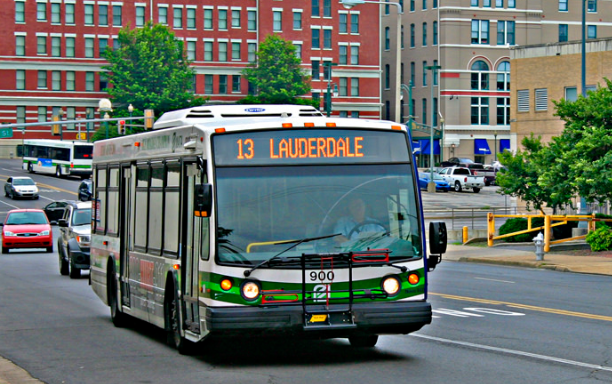The current level of transit service in Memphis is bleak. So a week ago, 11 Shelby County public defenders took part in Bus Rider's Day, which Commercial Appeal columnist David Waters called "an exercise in empathy and, as it turned out, endurance" to understand the transportation challenges facing their clients.
The group, organized by assistant public defender Kelly Pretzer, spent the day waiting for buses that never came, trying to figure out which buses stop where, and hearing stories from riders who say drivers sometimes stop mid-route with a bus full of passengers to get lunch. For their clients, this unreliable service can be a significant hurdle to get to court-mandated appointments and stay in good standing with the law.
Waters writes:
Most participants have some court-mandated appointment every week day, and sometimes two or three a day in different parts of town. Most either don't have cars or they've had their driver's license suspended. Many take the bus.
"As you know," Pretzer's handout said, "many of our clients are treated with skepticism when they say they missed an appointment because of a bus schedule."
Yesterday, the Commercial Appeal published a response entitled "How to ride a MATA bus" from Gary Rosenfeld, the authority's interim chief executive. He didn't put his best foot forward.
"Riding a bus in Memphis requires planning, which is what many of our customers do every day. When riding a bus, you need to plan appropriately," he wrote, before directing the public to check schedules using the authority's website or call-in help desk.
Blaming people for not knowing how to ride the bus is a bold position for a transit agency that, according to statistics cited by the Memphis Daily News, has seen its yearly ridership drop from 12 million trips a decade ago to 8 million today. That can't be explained away by claiming that people are too lazy to look up a bus schedule.
Rosenfeld's defensiveness unfortunately obscured his core message: The authority, which has been making zero-cost tweaks to improve scheduling, is getting barely enough money to keep its head above water. So it's asking for an additional $30 million in operating and capital funds each year to drastically improve and expand bus service. Rosenfeld explains:
That level of investment would expand bus service by over 50 percent, adding more than 200,000 hours of service and enabling more than 3 million more rides per year, which effectively enables a rider to go from anywhere in the city within an hour. That is key to being able to provide more than 10,000 additional people per day the opportunity to seek jobs citywide. New funding and new service would increase access to jobs, putting 80 percent of Memphis jobs and 70 percent of the residents of Memphis within walking distance of a bus stop.
Securing that investment will be an uphill battle. In 2012, a one-cent gas tax hike to fund MATA was opposed by Councilman Jim Strickland and was ultimately voted down by 62 percent of city voters. A new transportation funding deal signed by Tennessee's governor earlier this month allows municipalities to put other sorts of transit tax increases to a vote. On the other side of the state, Nashville's mayor is already pursuing a ballot initiative next year and is pushing a new light rail line as her marquee project.
The multi-million dollar question in Memphis right now is not whether people are reading bus schedules closely enough. It's whether Jim Strickland, now the mayor of Memphis, will change his tune and follow Nashville's lead to ensure his city's transit system gets the funds it needs.






